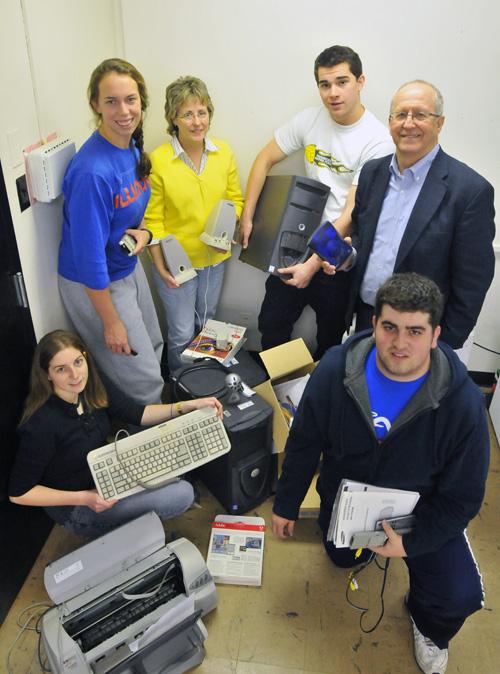Seminar explores uses for old, used electronics
Professor William Bullock and members of the design seminar pose with some equipment used as part of their Industrial Design course on sustainable e-waste. Erica Magda
Dec 5, 2008
Last updated on May 13, 2016 at 05:58 p.m.
In the midst of the nation’s rush to “go green,” an industrial design seminar has spent the semester researching regulations about electronic waste and beginning to explore new options for the reuse of old computer, printer and television parts.
This semester’s group is compiling its findings into a report to give background information about electronic waste, or e-waste, to University faculty and interested corporations, said Marissa Dolin, graduate student and teaching assistant for the course.
“We’re creating a paper to be the backbone to say, ‘Here’s what we know so far,'” Dolin said.
The research will also be used next semester when a course called Sustainable E-waste Design will break into teams to build new computers from old computer parts.
Get The Daily Illini in your inbox!
Students will organize an e-waste drive, and use the materials gathered to create functioning products, Dolin said.
Students in the seminar this semester have researched how e-waste is handled on campus, state laws about reusing e-waste, and national and international trends.
Many of the eight people involved will continue working on the project next semester, Dolin said.
At the University, the group did a walking inventory of the Art and Design Building to see how many computers were in the building and how many were in use, said Joyce Thomas, graduate student and seminar member.
“One goal is to evaluate what the e-waste situation on the UIUC campus is,” Thomas said. “Because there are urban legends, believe it or not, that say there are computers stored in buildings because people don’t know how to get rid of them.”
The group only found one computer in storage at the Art and Design building, but they plan to investigate more buildings in the future.
This research is important because old ways of recovering copper, palladium, platinum and other materials from computers release toxic compounds, said Willie Cade, chief executive officer of PC Rebuilders and Recyclers, a Chicago business that is working with the group.
It is also significant because of how much emphasis the University places on computing, Thomas said.
“We’re coming full-circle and looking at what happens to computers at the end of their life cycle,” she said. “I like that balance.”
Cade’s business installs Microsoft Windows XP onto old computers so they can be used again by schools and nonprofit companies.
Dolin said the seminar has taken on Cade’s practical approach and suggested ideas of usable products that can be made from old computer parts.
E-mail checking kiosks and kid-friendly computers both function well without complicated software and are possible to build from old parts, said seminar member Amy Cade, senior in FAA and Willie’s daughter.
Next semester’s course will allow for more experimentation, creativity and expansion on these ideas said William Bullock, chair of the industrial design program.
“They will work with small teams of students to build gadgets and experiment,” Bullock said.






